
EMERGENCY-REPATRIATION AND CAPACITY BUILDING ARE THE PRIORITIES
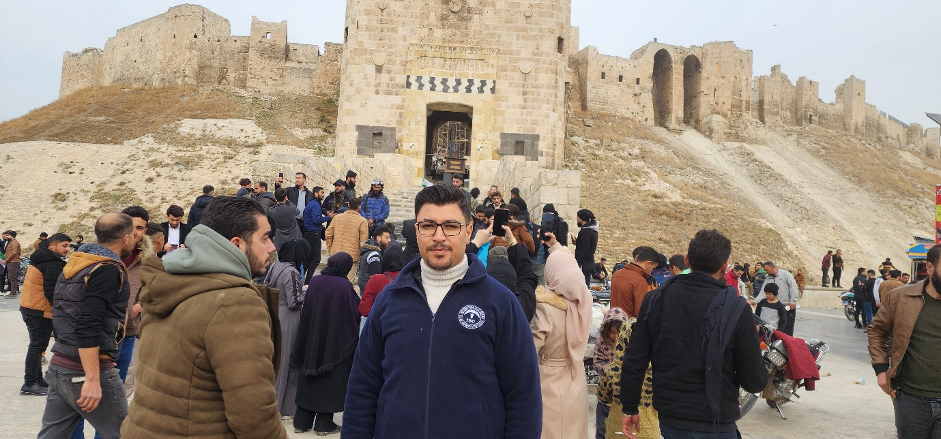
The fall of Bashar al-Assad was almost unthinkable just a week ago, when rebels started their astonishing campaign against the regime from their base in Idlib, in Syria's north-west. This is a turning point for Syria. Assad came to power in 2000 after the death of his father Hafez, who ruled the country for 29 years - and very much like his son, with an iron fist. Assad junior inherited a tightly controlled and repressive political structure, where opposition was not tolerated. At first, there were hopes that he could be different – more open, less brutal. But those were short lived.
Assad will forever be remembered as the man who violently repressed peaceful protests against his regime in 2011, which led to a civil war. More than half a million people were killed, six million others became refugees. With the help of Russia and Iran, he crushed the opposition, and survived. Russia used its formidable air power while Iran sent military advisors to Syria and Hezbollah, the militia it supports in neighbouring Lebanon, deployed its well-trained fighters. This did not happen this time. His allies, preoccupied with their own affairs, essentially abandoned him. Without their help, his troops were unable - and, in some places, apparently unwilling - to stop the opposition fighters, led by the Islamist Hayat Tahrir al-Sham (HTS).
First, they liberated Aleppo, the country's second-largest city, last week, almost without resistance. Then Hama, and days later, the key hub of Homs. With opposition forces also advancing from the east and the south, the offensive isolated Damascus. In a matter of hours, fighters entered the capital, the seat of Assad's power. The end of the Assad family's five-decade rule will reshape the balance of power in the region. Iran, again, is seeing its influence suffer a significant blow. Syria under Assad was part of the connection between the Iranians and Hezbollah, and it was key for the transfer of weapons and ammunition to the group.
Hezbollah itself has been severely weakened after its year-long war with Israel and its future is uncertain. Many believe this offensive could not have happened without the blessing of Turkey. Turkey, which supports Syrian National Army one of the main army groups liberated Syria from Asad regime, has denied direct involvement. For some time, President Recep Tayyip Erdogan had pressed Assad to engage in negotiations to find a diplomatic solution to the conflict that could allow the return of Syrian refugees.
At least three million of them are in Turkey, and this is a sensitive issue locally. But Assad had refused to do so. A lot of people are happy to see Assad go. HTS have spent the last years trying to rebrand themselves as a nationalist force, and their recent messages have a diplomatic and conciliatory tone. But many are not convinced and are concerned about they might be planning to do after toppling the regime. At the same time, the dramatic changes could lead to a dangerous power vacuum and eventually result in chaos and even more violence.
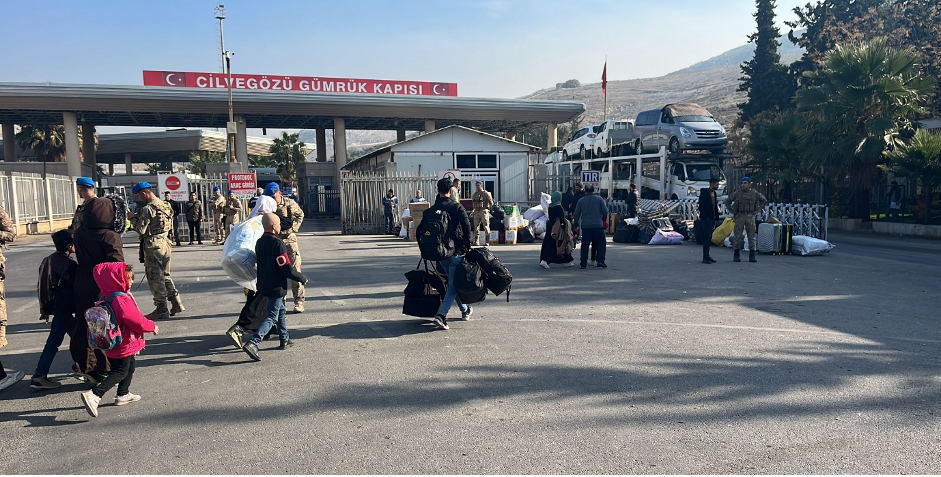
Recent developments in Syria, including the escalation in hostilities, have added to humanitarian needs in a country where more than 16 million people already required humanitarian assistance.
Since the escalation of hostilities on November 28, approximately one million people have been displaced internally. This includes 155,000 people experiencing secondary displacement. The majority of those displaced are women and children, with women and girls comprising nearly 50 percent of those forced to flee their homes. The most affected governorates are Aleppo, with 542,600 displaced persons, followed by Hama (347,100) and Homs (26,000).
WASH services are also impacted, with efforts underway to provide WASH facilities in collective centers. Additionally, the displacement has overwhelmed transit sites, highlighting the urgent need for winterization supplies, communal cooking facilities, and core relief items to support vulnerable populations.
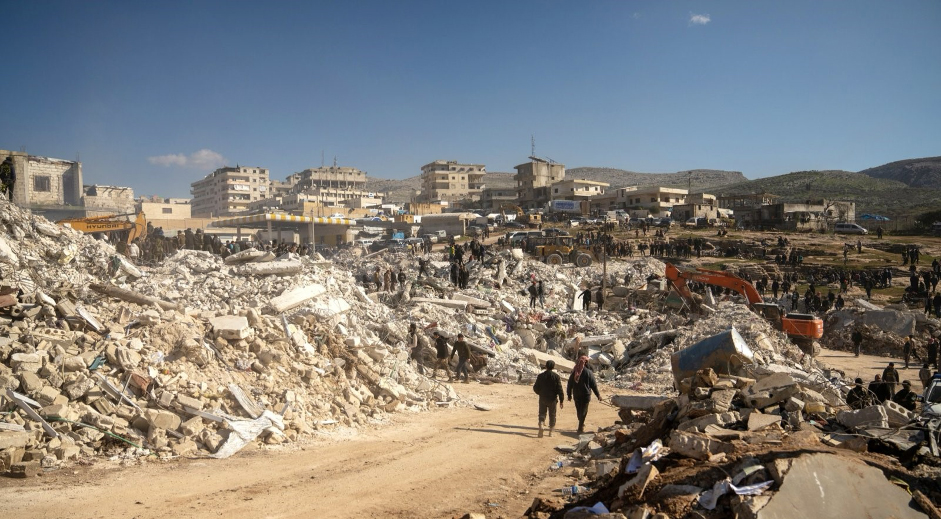
Protection: The security situation remains fluid, with concerns about lawlessness and theft,. New displacement continues, with reports of people moving from Damascus to Lattakia, Tartous on the coast, and Tabqa in the north-east. The ongoing displacement exacerbates the vulnerabilities of affected populations, with displaced families facing heightened protection risks such as psychological distress, limited access to essential services, and challenges to their safety. Vulnerable groups, including pregnant women, infants, and the elderly, are particularly at risk. The fear of child separation has grown among families amid the ongoing crisis. Explosive remnants of war, including landmines, continue to pose significant risks, particularly around critical infrastructure such as roads and health facilities. The latest hostilities have worsened contamination levels from explosive remnants of war, further endangering civilians.
Food Security and Agriculture: The value of the local currency has declined sharply, with the exchange rate increasing from 15,800 SYP to 30,000 SYP to the dollar on average in Syria, and to 40,000 SYP to the dollar in Aleppo by 7 December. Food prices have risen dramatically, with shortages reported in Homs, Hama, Damascus, and Rural Damascus. People in these regions stockpiled food, and many shops have been closed. Displaced populations across Syria urgently need food assistance, including over 524,000 bread distributions and over 12,000 ready-to-eat meals (RTE’s). In North-west Syria, distribution efforts were disrupted, and many people feared leaving affected areas. The food security situation in north-east Syria is also worsening due to the large influx of displaced populations. Many families are struggling to access adequate food, leading to increased vulnerability, especially in areas like Tabqa and Raqqa, where resources are strained.
Health: Intensified hostilities have severely impacted the health system, particularly in Aleppo, Idleb, and other affected areas. Health facilities have been overwhelmed, with major hospitals operating at limited capacity due to shortages of staff, medicines, and supplies. Over 30 health partners suspended services, and 19 attacks on health services were reported, harming health workers. Blood banks, dialysis centers, and ambulances are non-functional due to the impact of hostilities and underfunding. Displacement and disruption of services have caused significant psychological strain on the population. There is a rise in health issues, including acute watery diarrhea and suspected cholera, exacerbating vulnerabilities in overcrowded IDP centers.
Nutrition: A Rapid Needs Assessment by the Nutrition Working Group in north-east Syria found a 10% GAM rate among IDPs, indicating medium malnutrition levels. Raqqa and Deir-ez-Zor are under curfew, halting many humanitarian activities. Health facilities in Aleppo and Idleb are severely impacted, leading to NGO suspensions and the closure of Outpatient Treatment Centers (OTPs) and mobile teams.
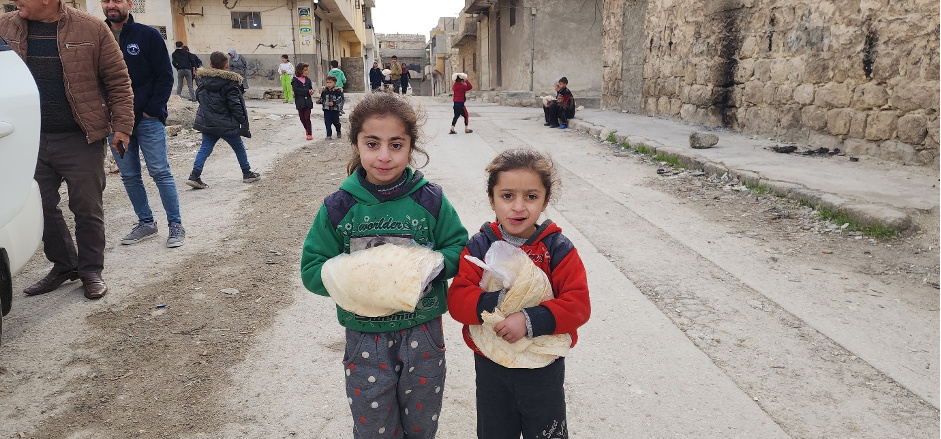
Feeding challenges include a lack of cooking utensils, poor hygiene, and limited food variety, which are exacerbating breastfeeding difficulties. Immediate action is needed to address malnutrition and improve feeding practices. On 6th of December, the Whole-of-Syria Nutrition Sector released a statement to all nutrition partners with key messages on Protecting Maternal, Infant and Young Child Nutrition.
WASH: Access to water, sanitation, waste services, and hygiene items is limited due to service disruptions, affecting displaced populations and residents, particularly women and children in collective centers hosting IDPs. Public health risks are rising. Some partners in previously government-controlled areas have ceased operations. Theft of equipment in rural Aleppo has worsened access to water, potentially impacting public populations. The WASH Cluster calls for the protection of civilians and infrastructure, including water facilities.
Logistics and Emergency Telecommunication: Transporters face significant challenges using major roads outside of Damascus due to insecurity and uncertain fuel supplies. Many transportation companies have declined business to avoid commandeering for military efforts.
Early recovery and livelihood programs have resumed in Northern Aleppo, but in Idleb, most remain suspended, leaving 125,000 people without essential livelihoods support. Straining local economies and livelihoods in Raqqa, Tabqa, and Al-Hasakeh. Disrupted livelihoods, especially in agriculture, have increased dependency on humanitarian aid.
Education: Over 3 million children are unable to attend school due to ongoing hostilities. More than 1,000 schools are being used as shelters for internally displaced families.
Cash Assistance: The ongoing hostilities and displacement in north-east Syria have increased the need for cash assistance to help IDPs meet basic needs. Many displaced families face financial hardship, making cash transfers crucial for survival and stability.
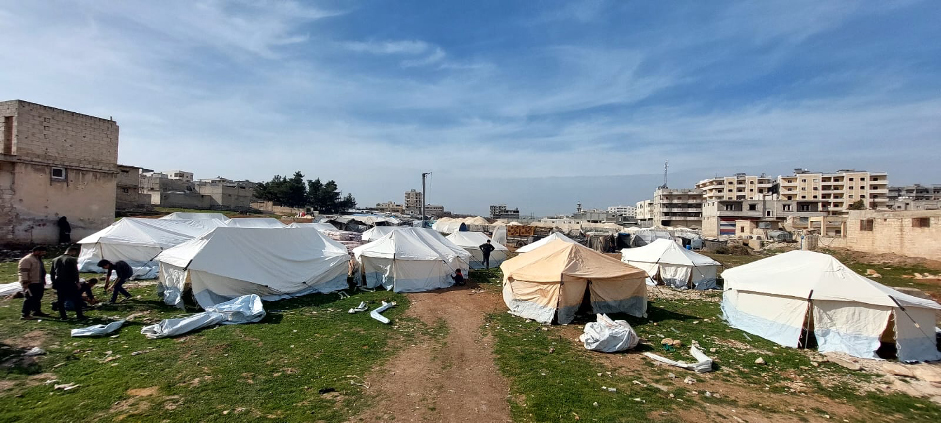
Protection: In the Southern Governorates, including Homs, Damascus, and Rural Damascus, partner operations are largely suspended. Many displaced families from rural areas have sought shelter in Masyaf, where several hosting centers are accommodating them. In Aleppo, six community centers are operating at limited capacity. In north-east Syria, over 140 collective shelters have been established, providing integrated protection services to approximately 120,000 IDPs. The north-west Protection sector has activated 45 community centers to deliver protection and legal support, reaching nearly 3,000 IDPs. Protection agencies are conducting ongoing assessments, offering psychological first aid, deploying mobile protection teams, and addressing urgent protection needs. Coordination efforts are focused on mapping emergency services for improved case referrals and ensuring the safety of displaced families. The Child Protection Area of Responsibility (CP AoR) is developing a tracking tool to identify Unaccompanied and Separated Children (UASC) and exploring alternative care arrangements for them. Efforts to track and assist UASC in transit sites are ongoing, with the Case Management Task Force collaborating with the Women’s Committee to establish temporary care solutions. Mine action partners are prioritizing clearance operations in areas near schools and public spaces, working in coordination with health authorities to ensure safety. They are also providing victim assistance and addressing risks associated with unexploded ordnance to enhance community safety.
Food Security and Agriculture: Despite challenges, food security partners responded with distributions across Syria. In Aleppo, 19,500 hot meals and 1,000 fresh meals were provided, along with 370 RTEs. In Hama, 3,440 people received 688 RTEs, and 906 people in shelters received hot meals. WFP and partners supported 6,025 people with RTEs in Lattakia and Tartous. In Deir El Zor, 100 people received fresh meals, and in Northeast Syria, 6,845 people were assisted with RTEs in Ar-Raqqa. The sector coordinated closely with partners to ensure timely assistance, creating tracking tools for food distributions. Food Security and Livelihoods (FSL) partners are providing emergency food assistance to thousands of displaced households across 66 locations in north-east Syria. Additionally, local initiatives, including hot meal distributions and welcome kits, are ongoing to meet immediate food needs.
Health: Health sector partners continue to provide critical services in affected areas, including trauma care, blood banks, and vaccinations. UNICEF and UNFPA have deployed mobile teams and established fixed clinics in Homs. WHO distributed cholera tests and treatments and supported health services in Raqqa. Mobile medical teams provided essential services to displaced people in Lattakia. Partners are also working to strengthen health surveillance and improve access to critical care, despite security challenges. Health partners are providing services through Mobile Medical Units (MMUs) in reception centers and schools across Raqqa, Tabqa, and Al-Hasakeh. Prepositioning supplies at key health facilities like hospitals is helping to prepare for increased patient numbers.
Nutrition: The Whole-of-Syria Nutrition Sector issued guidelines to protect maternal and child nutrition on 6 December. Nutrition Working Group partners activated 35 Rapid Response Teams (RRTs) to cover gathering points in Ar-Raqqa, Al-Hasakah, and Quamishli, providing malnutrition treatment, supplementary feeding, and Infant and Young Child Feeding in Emergencies (IYCF-E) messages. The teams also refer severe acute malnutrition (SAM) cases to stabilization centers. In north-west Syria, nutrition partners are providing high-energy biscuits and LNS-MQs to vulnerable groups. Partners continue to face significant gaps in nutrition counseling and breastfeeding support.
WASH: WASH partners provide emergency services to displaced people in Ar Raqqa and Taqba hosting centers. Services are being delivered in 8 reception centers in Northwest Syria, assisting 2,500 people. The Ministry of Water Resources (MoWR) continues its work until new administrative arrangements are made. The WASH Cluster advocates for protection of infrastructure and coordinated responses in all areas. WASH partners in north-east Syria are conducting assessments in collective centers and distributing core hygiene kits in 94 locations. They are also rehabilitating facilities and providing water through trucking and tanks to address immediate needs.
The Logistics Cluster is reactivating the LOGIE platform to map road access and logistics infrastructure updates. Efforts include finding alternative storage for Aleppo, resolving transportation challenges, and addressing security incidents at the UN Sheikh Najjar warehouse to resume distribution needs.
Eary Recovery and Livelihoods: While life-saving assistance remains a priority, limited early recovery efforts focus on road clearance, with plans for emergency road repairs in Idleb and Northern Aleppo to restore access. Humanitarian partners are providing food assistance, cash transfers, and livelihood support to displaced populations in over 66 locations in north-east Syria. Efforts aim to improve food security and economic independence for affected families.
Education: Safe spaces for children have been established in reception areas. Distance learning initiatives using platforms like WhatsApp have been launched. Coordination meetings continue to plan education interventions and assess immediate needs.
Cash Assistance: The Cash Working Group is coordinating cash assistance efforts, including Multi-Purpose Cash Assistance (MPCA) in Tabqa, Al-Hasakeh, and Kobani. Registration is ongoing to support thousands of households in urgent need.
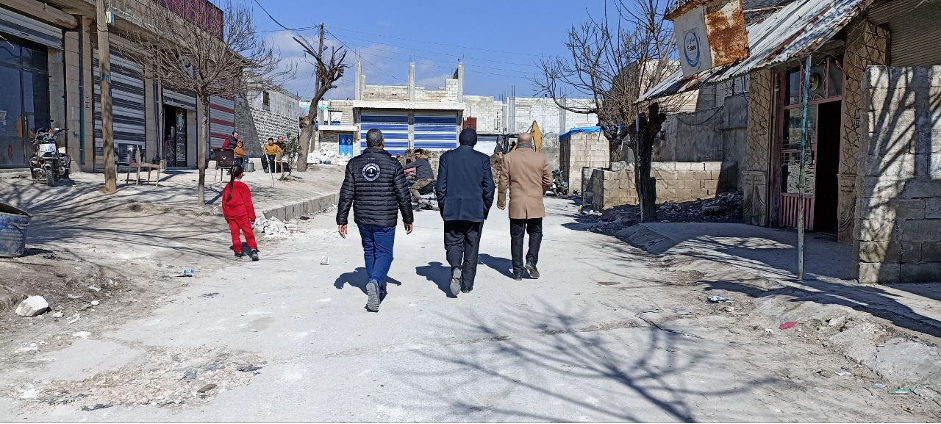
Protection: As civilian and aid worker movements increase, protection needs are growing and being documented, especially among new arrivals in north-east Syria. Many IDPs face dire conditions, with limited or no access to basic services at collective shelters. WASH services are particularly lacking, further exacerbating the vulnerability of displaced populations. Gaps in mental health and psychosocial support, as well as essential protection services, highlight the need for increased resources to enhance protection monitoring and provide support to vulnerable groups. Immediate child protection services are urgently needed, including psychological first aid and awareness-raising programs to prevent child separation. Support for unaccompanied and separated children (UASC) is critical, with a focus on providing temporary care arrangements and exploring alternative care options. Improved coordination and data collection efforts are essential for identifying and supporting UASC effectively. The need for enhanced explosive ordnance risk education (EORE) and expanded mine clearance efforts is pressing, especially in newly established displacement sites and high-risk areas. Teams must be deployed to clear critical infrastructure, such as roads, to ensure safe passage for civilians and aid workers. Additional resources are required for the rapid deployment of clearance teams and victim assistance programs to address the persistent threats posed by explosive remnants of war.
Health: Health services face severe shortages of specialized staff, medicines, anesthesia, and surgical kits. Hospitals struggle to access supplies, and emergency services are underfunded and overwhelmed. Ambulance services are limited by fuel shortages, and trauma care capacity is insufficient. There is a critical lack of water and transportation, further complicating access to healthcare and increasing the risk of waterborne diseases. Health sector partners need additional medical teams, trauma kits, and surveillance systems to meet rising demands. There are critical gaps in healthcare services, with limited access to medical care in some displacement sites. Additional resources are needed to expand health services, including the distribution of medical supplies and increased capacity to handle the rising number of patients.
Nutrition: The nutrition working group’s assessment highlighted critical gaps in infant and young child feeding practices, including feeding-related issues such as the lack of cooking utensils, absence of suitable food options, poor hygiene conditions, inadequate cooking facilities, and limited food variety. Mothers face challenges in breastfeeding due to these poor conditions, while random distribution of infant formula and powdered milk undermines exclusive breastfeeding and appropriate infant feeding practices. There is an urgent need for immediate support to address these challenges and promote safe and appropriate feeding practices. Despite ongoing efforts, there is still a lack of sufficient nutrition counseling and a need for dedicated spaces to support mothers with breastfeeding and counseling.
WASH: Hosting centers in Ar-Raqqa are facing severe shortages of water, sanitation, and hygiene services. Immediate resource mobilization is necessary to scale up the response. Returnees from Türkiye and within the north-west need assessment to understand WASH service needs. The priority is to ensure the continuation of essential systems and support technical work, power, and maintenance to prevent service gaps and humanitarian consequences. There are significant gaps in water and sanitation services, particularly in newly established displacement sites in NES. Additional support is needed for water trucking, facility rehabilitation, and hygiene promotion to reduce health risks in overcrowded centers.
Logistics and Emergency Telecommunication: Access to northeastern Syria is constrained. Insecurity and issues like rising fuel costs, fluctuations in exchange rates and national highway congestion further delay shipments and reduce available aid.
Eary Recovery and Livelihoods: Explosive hazards in Aleppo and airstrikes in Idleb have disrupted recovery efforts, while market instability, rising prices, and limited goods further strain vulnerable households. 6,000 households in Tabqa in urgent need of assistance. Additional resources are required to scale up cash interventions and support emerging IDP-hosting areas.
Education: There is an urgent need for safe and temporary learning spaces for displaced children. Education resources, supplies, and psychosocial support services are required. A comprehensive assessment of school-age children in shelters is needed to guide interventions.
Cash Assistance: There is a high demand for cash assistance in newly established IDP-hosting locations. Additional resources are needed to scale up MPCA programs and support the growing number of displaced families in the region.
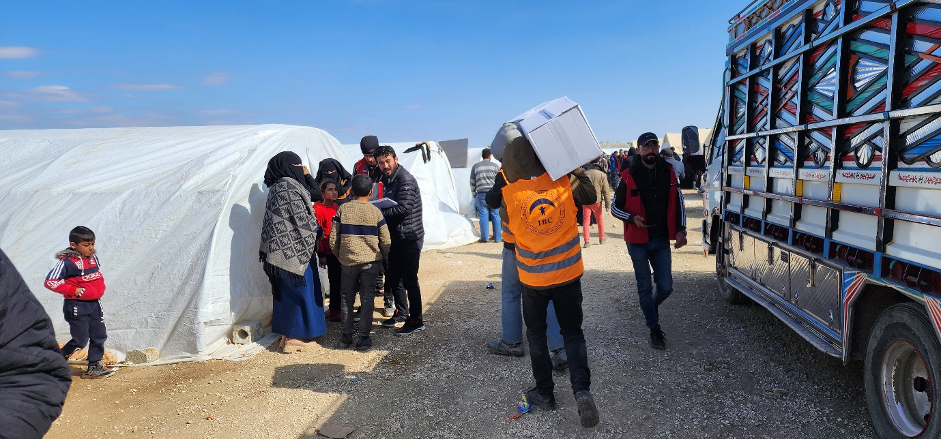
IBC-International Blue Crescent is operating in Syria since 2003 through its offices in Damascus and Aleppo(Azaz) After revolution movements started in 2011 and the brutal oppresion of Asad regime by 2013 most of the operations shifted to meet needs of the IDP s displaced to North Syria Opeartion Center for projects in North Syria established in Kilis (Border town in Turkey) and through Oncupinar gate emergency relief delivered to Aleppo and Idlib governorates. After two years IBC estalished a new operational center in Azaz Aleppo in order to implement projects focused on emergency needs, health, capacity building and recovery including shelter needs.
In this framework different camps in Harameyn, Mukawamah, Akhtarin have been established and run by IBC. In addition four health centers as in Azaz Dabiq Al Bab and Akhtarin were fully supported by provision of consumables equipment and medicine. Wash projects, water and sanitation activities as reactivating water systems and during Covid 19 pandemia time vaccination and sanitation campaigns implemented.
On the other hand through IBC Damascus office between 2015-2018 thousands families in Hama Homs and Reef Damascus benefited from monthly food and hygiene campaigns. Four health centers rehabilitated and activated in Damascus in cooperation with different INGO’s. IBC-International Blue Crescent assessment teams in Damascus and Aleppo are in the field in order to develop the new strategy for the coming months.
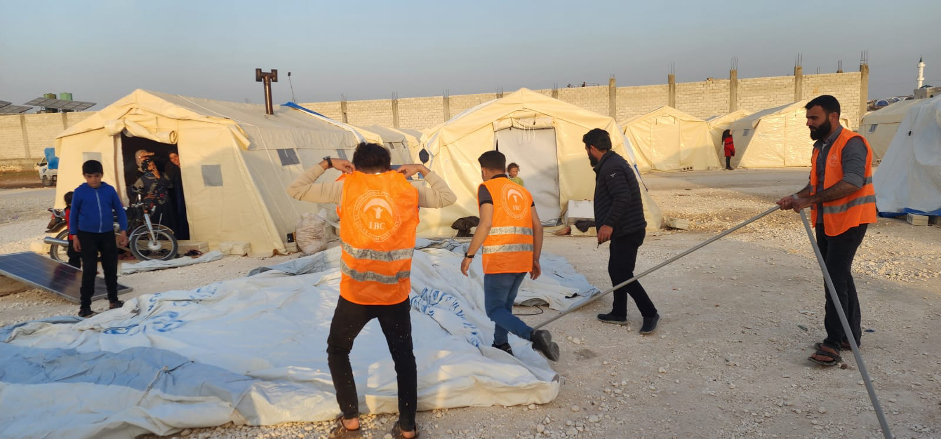
IBC has already started to distribute food in the reception centers in Aleppo and mobilized its resources to cover the equipment and medical needs of the health centers in Aleppo Governorate. On the other hand IBC is planning to move two Mobile Food Caravans to Aleppo and Azaz in order to provide hıot meal to 2000 families on daily basis preferably those families who moved recently from their exile to the home towns and need assistance to re-settle their lives. In Damascus four health centers are identified in need of equipment and consumables so this is targeted to be covered. On the other hand repatriation campaign is launched in Turkey with the purpose of supporting financially and with logistic support as well as by providing basic homeware and needs in Syria to those want to go back to Syria to their hometowns.
The operation will be implemented through IBC HQ and Kilis/Hatay offices in Turkey side and Azaz and Aleppo offices in Syria side. IBC is implementing its operations through Damascus Main Office and Aleppo and Homs sub offices. Kilis and Hatay offices(Turkey) and Azaz in Syria will be the logistics operational centers mainly focuisng on repatriation and delivery of goods and services from Turkey. Damascus office is operational but fully engaged in a week to UN and other organizations coordination meetings and clusters IBC field temas identified five villages in Aleppo for rehabilitation, reconstruction, agricultural capacity building and income generation programs and developing the detailed project. In addition, six reception centers in Hama and Aleppo will be supported. The total budget for the emergency response health activities and repatriation operations is Forecasted as 3.5 million USD s for the three months ahead, subject to increase depending of the needs and capacity in the field.
For further information Contact:
Muzaffer Baca (Vice President): [email protected]
Dr. Asaf Mohamed (Syria Programs Director): [email protected]